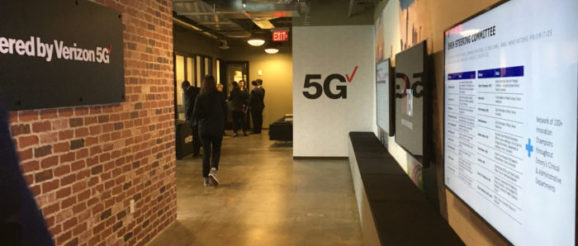Verizon & Emory Healthcare Open First 5G Healthcare Innovation Lab In The U.S.

With a ribbon-cutting ceremony, words of support from executives and business leaders, and even a spot-on vanilla cake replica of the lab’s equipment setup, Emory Healthcare and Verizon announced the creation of the first 5G healthcare innovation lab in the U.S. in Atlanta.
“You can probably tell by my voice, it’s very exciting,” Kim Mirabella, Verizon’s director of government sales for the Southeast, told Hypepotamus during last Friday’s grand opening. “We’re going to be able to do things that we don’t even know are possible, starting now.”
The Emory Healthcare Innovation Hub (EHIH) is not Verizon’s first 5G lab — there are four others in the U.S., focusing on areas from entertainment to public safety — but Atlanta has the only one specifically focused on healthcare.
According to a statement from Verizon, EHIH is part of a broader strategy “to partner with customers, startups, universities and large enterprises to explore how 5G will disrupt and transform nearly every industry.” The telecommunications giant will also provide additional services, such as consulting, project management, infrastructure, and network and security management.
“The healthcare industry, driven by value-based care and increased consumerization, is set for a paradigm shift that will put a much greater focus on connectivity and access to data,” Scott D. Boden, M.D., Vice President for Business Innovation for Emory Healthcare, said in a statement. “Across every facet of healthcare, from care innovation to reimbursement model transformation to decentralization of care, speed to data is critical to the digital evolution of health.”
With a stated goal that signals nothing less than healthcare industry transformation, there are already ideas of how the increased speed and connectivity of Verizon’s 5G Ultra Wideband service will change things.
The EHIH intends to use 5G in such medical services as remote physical therapy, robotic-assisted surgery, next-gen medical imaging, and even connected ambulances, which will be able to offer point-of-care diagnostic and imaging systems as patients are taken to emergency rooms.
The Hub will also explore medical training through augmented reality (AR) and virtual reality (VR) applications, along with telemedicine and the ability to monitor remote patients.
James Lewis, co-founder and CEO of 11Ten Innovation Partners, spoke of his excitement during the pre-tour presentation, and used the limited implementation of the digital stethoscope, modernized in ways that are highly beneficial but not widely used by doctors, as an example of how just having a good idea and the ability to create the technology isn’t enough.
“You can literally have affordable technology that can run a stethoscope exam, do an EKG and have an ultrasound image of the heart, all remotely. It’s just a big innovation, but it’s all about adoption.”
Leveraging partnerships with 11TEN Innovation Partners and existing Innovation Hub collaborators such as Sharecare, Philips, Novo Nordisk, and Merck, EHIH is intended as a way to identify solutions to some of the healthcare industry’s biggest problems, and make sure they actually get out into the world.
“With 5G, doctors should be able to do things like create holographic 3D anatomical renderings that can be studied from every angle and even projected onto the body in the OR to help guide surgery,” said Tami Erwin, CEO of Verizon Business Group, in a statement. “The potential of Verizon 5G Ultra Wideband combined with mobile edge computing to transform healthcare is limitless.”
